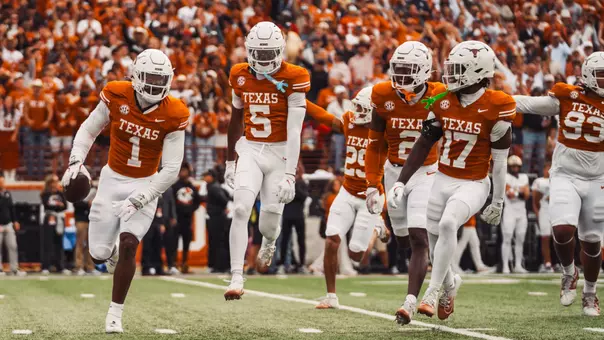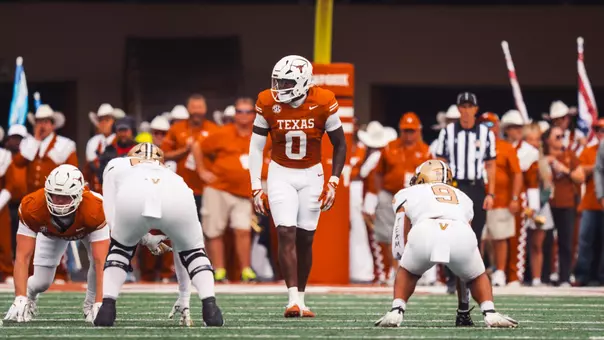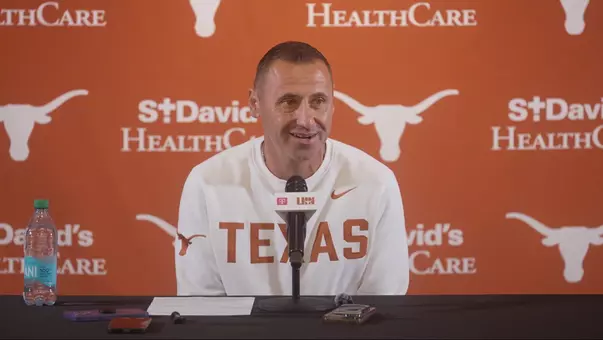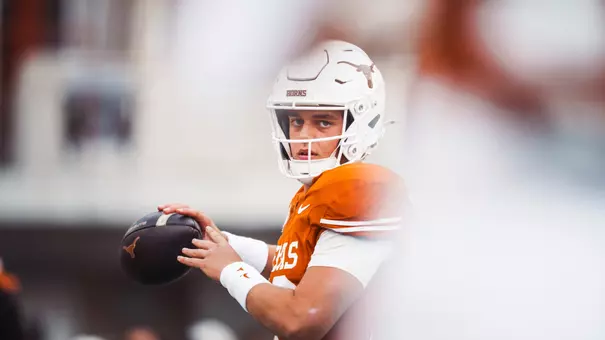The University of Texas at Austin Athletics
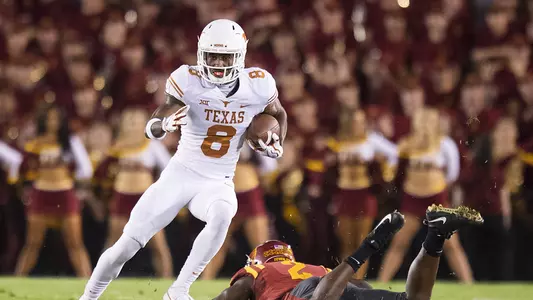
Hurricane Katrina relocated Dorian Leonard's family and football became his guiding light
10.20.2017 | Football
After moving to Texas and bouncing from house to house, Dorian Leonard nearly abandoned his football dreams. Now a senior, he aims to make the most of his last games as a Longhorn.
By James Rodriguez
The community of Metairie, Louisiana, a suburb of New Orleans located on the shores of Lake Pontchartrain, is one of the most populous areas in Jefferson Parish and home to a vibrant historic district. There, just a 10-minute drive from The Big Easy, Dorian Leonard grew up playing football, basketball and baseball, surrounded by his extended family.
That all changed on Aug. 29, 2005, when Hurricane Katrina struck the Gulf Coast.
At the insistence of his grandmother, Leonard and his family ignored the area's mandatory evacuation and remained in their home to ride out the storm. Leonard's younger brother, Donovan, was a newborn at the time, and items such as diapers and milk were difficult to find among the shuttered stores after the flood.
"That was one of the roughest parts of my life, because you don't know what's going to happen," Leonard said. "There's water coming in, you don't know if people are going to be able to come and find you."
Leonard nearly quit football forever in the years after the hurricane, when money was tight and his family bounced from home to home, sometimes squeezing into cheap hotel rooms or going without power. But the football field was also where he found solace, and eventually, a path forward. With roughly half of his final season at The University of Texas in the rear view mirror, the senior wide receiver is looking to make every game count — and remains grateful for the chance to leave his mark.
Life in Longview
Metairie, like most of the surrounding area, was devastated in the aftermath of Katrina. With Leonard's father absent, Leonard's mother, Latanya Lee, decided to move the family from Louisiana to Texas. They settled in Longview, a northeast Texas town just an hour from the Louisiana border, with Lee's high school sweetheart, whom she eventually married.
Leonard's future stepfather knew the coach of the local little league football team, and Dorian began playing football and basketball again. He was a basketball player at heart, a preference that his mother encouraged; she was wary of the jarring hits that come with playing football. But Longview wasn't known for its hoops, and few basketball scouts came to the area. As Leonard blossomed into a formidable football player, he began to see a future in the sport.
 "I always ended up going back to football, because if people feel like you're good at it, you do it," Leonard said. "
"I always ended up going back to football, because if people feel like you're good at it, you do it," Leonard said. "
As a junior in high school, Leonard was in the midst of a breakout season, grabbing the attention of coaches from around the country in the process. But off the field, things were much less simple.
"After a couple games, I'm like, 'I don't even know if I can go home, I don't know if the lights are going to be on,'" Leonard said. "My mom always made sure we had something to eat, but it was like, you don't know if you're going to have power, you don't know if you're going to be able to take a shower when you get home, so you take a shower right after the game."
Leonard's family was homeless for a month, and there were several points during his high school years when he considered quitting football to earn money.
"It got to a point where I wanted to stop playing and I wanted to get a job, because when you get kicked out of your house, it's like, 'Okay, I've got to drop everything,'" Leonard said. "I didn't even want to go to school anymore because I knew my mom, she couldn't just do it by herself. But my mom, she constantly stayed in my ear, 'I'll take care of it, I'll do everything.' She convinced me to really just stay in school and finish it out."
A break came after his junior season when Jay Norvell, then a co-offensive coordinator and wide receivers coach at Oklahoma, called to offer him his first athletic scholarship.
"I just paused, and when I told my mom she just stopped everything," Leonard said. "She just started crying. I just told him thank you and I'll talk to him later, and I went over there and we both just sat there crying for I don't know how long. It was just a lot of relief. When we heard that news, it was like man, we might make it. It's paid off. I just kept thanking her."
Offers began to roll in from the likes of Florida State, Oregon State and, of course, Texas. At that time, Leonard's knowledge of college football was mostly limited to the NCAA video games he played with friends. Extra details like rivalries and school histories were foreign. So when he narrowed his final two schools to Oklahoma and Texas, Leonard unwittingly placed himself squarely in the middle of one of college football's most storied grudge matches.
"People were making a big deal about it, but I didn't know about the rivalry," Leonard said. "So I'm in high school, I'm like, 'Okay, why is everyone making a big deal about it?' I just wanted to end it."
On an official visit to Texas, Leonard visited the academic center and was impressed by the focus on earning a degree. As player after player told him about the benefits of graduating from The University of Texas, the school quickly rose to the top of his list.
"Texas was just that perfect fit," Leonard said. "You can get a really good education and you can graduate from here and open some doors for yourself, and you can still be kind of close to your mom. Once I figured that out in my head, it was a no-brainer. It was set. Nothing could change my mind."
Leonard called head coach Mack Brown to commit before his senior season, and was unfazed when Charlie Strong arrived at Texas to take over the program early the next year. He knew he wanted to be a Longhorn.
Still, his family's financial woes persisted. During his senior year, Leonard's family crammed their belongings into a two-bedroom hotel room to save money. A friend's family took him in, and he spent nearly all of his time outside of school at their house. He begged his mother to remain in Longview so that he could finish his senior year at the same school.
"Money was tight down there, and that's why I had to beg my mom to stay, because it was so hard for her to find work down here," Leonard said. "So I had to really beg her, 'Please, let me finish out my school year here.' I always just tell her out of nowhere, 'I love you,' because the things that she did with so little, it's amazing. A normal person would just give up."
More bad news followed. The day before Longview was set to play North Mesquite, Leonard received word that his grandfather had passed away.
"That was a big strike on our family," Leonard said. "He was my male role model throughout my life because I didn't have my dad there all the time. My grandpa was the guy I looked up to."
Through it all, football continued to provide an escape for Leonard.
"Without football, I don't know what would be going on," Leonard said. "I'd probably go crazy, all the things that went on. I could've been out there in the streets and stuff like that, especially the area of Longview I was in. A lot of my friends, they didn't really make it to college, so they had to find other ways to make money."
The Texas Years
Leonard arrived on campus in the summer of 2014. He got a dose of Texas history during a practice that fall, when he was on the scout team the week of a game against Brigham Young University. For most Longhorn fans, the 2005 national championship game is required viewing. But when Vince Young scampered into the end zone on fourth-and-six on that January night, Leonard's family was still reeling from Katrina. His education in Texas football history would have to wait.
Today, Leonard laughs as he recalls the instance when he began learning about one of Texas' most legendary players.
"One of their receivers was number 10, and I was like okay, let me wear the number 10 jersey," Leonard said. "They were like, 'You're not gonna wear that jersey, its retired, we're not giving that out to nobody.' And I was like, 'It's retired?' So that's when I started learning about Vince."
Leonard recorded his first career catch later that season against Oklahoma, a seven-yard reception that he hauled in despite running the wrong route due to nerves.
His junior year, Leonard played in all 12 games and started seven at outside wide receiver, totaling 397 receiving yards and three touchdowns. But if there is a defining play for Dorian Leonard — one that fans will remember above all others — it is likely his touchdown catch against Oklahoma in 2016, when he juggled a deep pass from Shane Buechele along the sideline before firmly gripping the ball as he sprinted into the end zone. A photographer captured the moment as he raised the ball above his head in celebration, and his mother now owns a framed copy of the image.
"That's one of those experiences I will never forget," Leonard said. "I replay it in my head all the time. That's one of the things I will carry with me for the rest of my life."
Then came another coaching change at Texas. Leonard initially clashed with head coach Tom Herman and his new staff during winter workouts, setting him back in an already crowded wide receivers room.
"Basically I was tired and it was just back and forth," Leonard said. "Basically they got on me, and it really set me back with them. The thing with these coaches is, they remember everything. Whatever you do, they're going to remember. So that set me back with them."
Wide receivers coach Drew Mehringer pulled Leonard aside and urged him to shape up. As a senior on the team, his leadership would be needed. Leonard began putting forth more effort, and later in the summer, Herman publicly recognized him for the turnaround.
"I apologized to all of the coaches about what happened, and from there it was focused in, listen to everything they say, do everything to the "T" no matter what," Leonard said. "It may be such a small thing, but if they give me a responsibility, I'm going to take it to heart. That was the moment where I was like, 'I've got to turn it on. This is my senior year. I don't want to go into my senior year on these coaches' bad side.' I just took that and that's always in my head."
As he faces the home stretch of his collegiate career, Leonard said his main goal is to make an impact in his remaining games in a Texas uniform.
"I'm just trying to give my all," Leonard said. "These could be my last six or seven games for the rest of my college career, or it could by my career period. So I'm like, why hold back? Why not go out there and give everything you have, especially for your teammates, your coaches and your family. If you're going to go out there, give it your all."
Leonard, inspired by his experiences with coaches and mentors through his childhood, plans to graduate with a degree in Youth and Community Studies. He returns to Longview for camps and to stop by his old high school, where he hopes to inspire student-athletes to aim for a college degree.
"Growing up, my dad wasn't really there for me, so I used a lot of my coaches and stuff to lead me in the right direction," Leonard said. "When I messed up they really cracked down on me, they were my role models that I looked up to. That's an impact I want to have on somebody someday."


